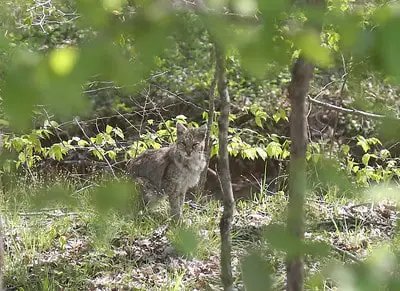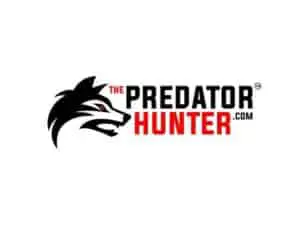Are you thinking about hunting bobcats in Pennsylvania? This article covers some of the fundamental laws you will need to know to get started. It also provides information such as seasons, harvest limits, and required permits for bobcat hunting in Pennsylvania. It is not a legal document and is not intended to cover all hunting laws and regulations.

In Pennsylvania, the bobcat season runs from Jan. 8-Feb. 2, 2022 and Jan. 7-Feb. 1, 2023. One bobcat per license year. Licensed furtakers may obtain one permit each. Hunting allowed only in (WMUs 2A, 2B, 2C, 2E, 2F, 2G, 2H, 3A, 3B, 3C, 3D, 4A, 4B, 4C, 4D and 4E).
Purchase a Pennsylvania hunting license here.
Check out all the Pennsylvania hunting seasons.
You can also hunt coyotes in Pennsylvania—learn the state’s coyote hunting rules here.
Learn the state’s fox hunting rules here.
Related: Is this your first time hunting bobcat? Learn the three vital steps to a successful bobcat hunt here.
If you are a property owner and require predator services or information, please visit to the Pennsylvania Predator Hunters Association.
General laws for hunting bobcats in Pennsylvania.
Suppressors. If you can legally own one, you may use it for hunting.
Electronic callers and decoys. Both are legal, as are hand and mouth callers.
While electronic callers are expensive, mouth and hand callers are less pricey but take time to learn how to use.
Read this article and watch the video to learn how to use a closed reed rabbit squealer.
Follow along as call manufacturer Brian Rush shows you three open reed calls you can learn and use today.
You can read about some highly effective but inexpensive ($20) coyotes decoys here.
You can check Amazon’s price list for callers and decoys here.
Hunting bobcats in Pennsylvania at night.
Night vision, infrared, and thermal riflescopes. These devices are legal.
I recommend the following articles:
- What color light to use for hunting predators—click here.
- The best infrared scope for new predator hunters—click here.
- The best thermal scope for new predator hunters.
Legal firearms for bobcat hunting in Pennsylvania.
Firearms for Hunting Furbearers
It is unlawful to take furbearers, including bobcats, with shotguns using shot larger than size No. 4 buckshot or implements that are not lawful firearms, bows, or crossbows.
Semiautomatic and manually operated rifles, manually operated handguns of any caliber, manual or semiautomatic shotguns and, bows and crossbows can be used.
Muzzleloading rifles or handguns that propel single-projectile ammunition can be used.
Air- or gas-operated firearms of at least 22-caliber and propel a single-projectile pellet or bullet can be used.
Persons hunting coyotes, foxes, bobcats, raccoons, striped skunks, opossums, and weasels may use gun-mounted lights that do not project a laser-light beam and handheld and sporting-arm, mounted night-vision and infrared (thermal) optics.
Porcupines may not be hunted at night.
Can you kill a bobcat on your property in Pennsylvania?
As always when dealing with a protected species—contact your local game warden or animal control officer when dealing with a problem bobcat.
If a bobcat is threatening human life.
Subchapter C is referred to in section 2141 of this title.
§ 2141. Killing game or wildlife to protect person.
(a) General rule.–It is unlawful for a person to kill any game or wildlife as a means of protection unless it is clearly evident from all the facts that a human is endangered to a degree that the immediate destruction of the game or wildlife is necessary.
(b) Report, safekeeping and investigation.–A person killing any game or wildlife under this subchapter shall report the event to an officer as soon as possible following the incident but in no case later than 24 hours, provide for safekeeping of the game or wildlife intact at the place where it was killed and be available for interview by the officer. The person killing the game or wildlife shall answer, without evasion, any pertinent questions of the officer making the investigation.
(c) Exoneration.–At the conclusion of any investigation when any game or wildlife is allegedly killed as protection to a person, the officer may exonerate the person for the otherwise unlawful killing of the game or wildlife. In all cases the officer shall seize and dispose of the game or wildlife as required by this title or upon instructions of the director.
(d) Prosecution.–Any officer making an investigation when game or wildlife was allegedly killed as a protection to a person shall proceed with prosecution as though the game or wildlife was unlawfully killed if the officer is dissatisfied with the explanation of the person killing the game or wildlife or if the physical facts of the killing do not support and sustain the facts alleged by the person killing the game or wildlife.
(e) Penalties.–A violation of this section relating to:
(1) Threatened or endangered species is a misdemeanor.
(2) Elk or bear is a summary offense of the first degree.
(3) Deer is a summary offense of the second degree.
(4) Bobcat or otter is a summary offense of the third degree.
Landowners and homeowners may not trap bobcats. Landowners should contact the region office that serves the county where they are located before trapping nuisance wildlife.
Harvest report required for hunting bobcats in Pennsylvania.
If You Harvest a Bobcat or Fisher.
A permitted person taking a bobcat or fisher shall, immediately before removing the animal from the harvest site, fully complete and attach to the animal the harvest tag furnished with the permit. The tag shall remain attached to the animal until it is mounted, tanned, made into commercial fur, or prepared for consumption.
A CITES tag automatically will be issued for bobcats that may be exported or sold. A CITES tag is not required for a fisher pelt.
Within 48 hours of harvesting a bobcat or fisher, a permit holder must report the harvest to the Game Commission through https://huntfish.pa.gov, or by calling 1-800-838-4431 or the nearest Game Commission region office, phone numbers for which are listed in the front of this digest.

